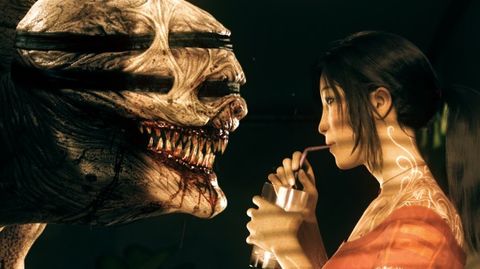Our Verdict
The weak combat and MMO padding hurt the experience, but The Secret World has innovation, atmosphere and charm.
PC Gamer's got your back
It's always disappointing to see a new MMO stick religiously to the framework forged by previous games. To its credit, The Secret World pushes further than most, departing from the norm in its setting, its systems and its objectives.
It aims high and doesn't always hit the target, but it's where it falls back on tried, tested, but unoriginal ideas that it does itself the most harm.
Whether you choose the power-hungry Illuminati, the evil-vanquishing Templars or the chaotic Dragon faction, the story starts when you swallow a magic bee. Gaia is on a recruitment drive, sending these insects on a suicide mission to the oesophagus and granting the recipients access to a secret world of ancient myths, urban legends and devastating power.
It makes for a limp superhero origin, but fits the game's everything-and-the-kitchen-sink approach to its story. Throughout, there's a resigned pragmatism to the characters you meet – the tonal equivalent to a shrug of the shoulders and a “meh, just go with it.”
Each main mission, whether integral to the central plot or your chosen faction, or specific to a particular character, is introduced with a cutscene monologue. Each scene has a wit and flow that keeps it engaging. Broad horror caricatures are given the chance to grandstand in an environment where, whether they're waxing philosophical, crazily conspiratorial or just generally unhinged, their fears and paranoia are all real.
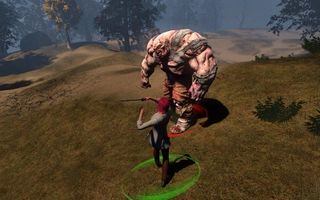
The game is never precious with its fiction, and it's refreshing to see a zombie apocalypse that isn't afraid to namecheck Left 4 Dead. While Funcom definitely front-load their best characters for the opening town of Kingsmouth, I'm yet to hit the point of wanting to skip past the dialogue to get on with the quest.
What doesn't quite work is the silent protagonist you play. It's an understandable omission given the amount of voice-acting already in the game, but as with everything else, the script continually draws attention to your silence. This constant lampshading only serves to alienate you from the experience. More problematic is your complete lack of expression. Your avatar is a wooden stump, standing blankly in scene for people to talk at. I had a moment of genuine shock when my character accepted a mint some 35+ hours into the game. She didn't accept a second. That would have been much too exciting.
In places, The Secret World has some of the best mission design I've seen in an MMO. Your main quests are broken up into three basic types: action, investigation and sabotage. You'll also find plenty of side-missions littered around the map, taking the form of fetch quests where you have to examine your surroundings and explore various places, hunting for the objective.
It's the investigation missions that frequently provide the most fun. They're puzzles, often realised as mini-Alternate Reality Games that require you to step out of the game world and use the internet to find clues to your next goal. (A web browser can be brought up in-game with the B key.) I've studied Bible passages that pointed me to the right Secret World NPC, found real websites using in-game business cards, and deciphered Morse code for clues. OK, technically my smartphone did the last one.
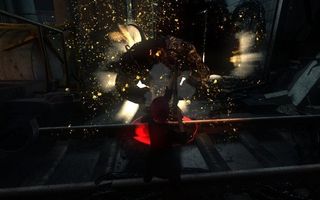
There is the occasional instance on the dreaded adventure-game logic, where the goal is more working out what the developers intended than what the clues point you to. One bizarre mission could only be finished by me killing my character and completing it in anima form, the state you exist in before respawning.
Despite such occasional quirks, there's an immense satisfaction to be gained from solving these puzzles. Communal puzzle solving, moreover, is a clever way to encourage friends to group together in a more meaningful way than a straight series of fights. Assuming of course, that you don't simply Google directly for the quest solution, negating the whole investigation.
Sabotage missions, meanwhile, are light on the puzzles, but tend to lean heavily on exploration and discovery. They also include stealth sections. These at least attempt something different in the MMO world, but are too wonky in execution to succeed. Set in basements full of security cameras and laser traps, the premise of these missions is that triggering either will cause the room to explode. The problem is that the detection AI is erratic: cameras fail to realise they shouldn't be able to see through the box you're hiding behind, and blow the room anyway.
Mission-breaking bugs can also halt your progress by not triggering the next stage of a quest. These bugs seem to exist only on specific servers, with Cerberus, the server my main character lives on, being the most frequently affected. It's a rare problem, but one that clashes with the natural speed-bumps of the puzzles. Is a quest bugged, or in need of solving? For the moment, it can be hard to tell.
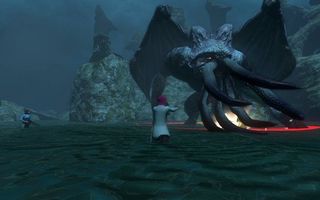
It's the action missions that provide the weakest link. There's some variety, but for the most part they're taken straight from the MMO kiln, moulded as usual. Head to a place, kill some things, trigger a unique variant of that thing. Typically these missions make up the bulk of your game time, and as you progress to new areas, you'll receive the same objectives, just with different monsters.
That the locations are so interesting goes a long way to make up for the padding. Secret World's warped yet real-world setting makes a big difference to the tone and atmosphere of a genre typified by elven treehouses and twee medieval villages. Instead, you'll visit brooding forests, haunted theme parks, infested mines and many more horror-inspired locations.
In its own peculiar way, the environment is often extremely colourful: apocalyptic reds, infected greens, septic blues and a whole host of neat art design choices straight from Cthulhu's own Crayola collection. That The Secret World forgoes the usual cartoony MMO design does take its toll on the technical side, however. Each of the areas, even the later stages in Egypt, are covered in a dense fog that does its best to hide low draw distances and enemy pop-in. It can't help but dilute the experience.
Perhaps most disappointing is that some areas feel like wasted opportunities. Throughout the second map, The Savage Coast, a shaft of light rotates overhead from the lighthouse in the bottom corner. The main mission when you finally arrive at this ever-present landmark? Trawl the surrounding area killing five of this, ten of that and fifteen of the other.
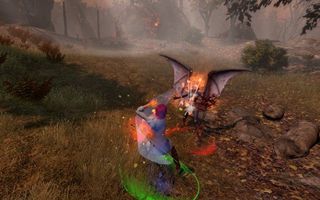
It doesn't help that the combat is so uninspired. It's not bad as much as perfunctory. Average. You hit the number keys of your hotbar in a repeat pattern as your character chip, chip, chips away at the enemy's health bar. Build Focus, which allows you to perform special moves, then dodge an attack, then repeat. As you progress through the levels, the mobs don't get more challenging, they just take more time to kill.
It was only a few hours in before I started blatantly gaming the system. Weaving a path between the attack triggers of mobs, sprinting through sections until my trail of pursuers tapered off, stepping up for an attack only when absolutely necessary.
At least the group dungeons make things more interesting. There, monsters can utilise the environment, electrocuting standing water, for example, to restrict the movement of players.
It's strange that the solo instances rarely take the same approach. Enter certain buildings or caves as part of a quest and you can trigger plot-heavy one-man areas that advance the story of your character. It's a more naturalistic system than The Old Republic's giant green and red barriers, but the monsters inside mirror the patterns of those in the open world. It took the entirety of the lengthy Solomon Island plot strand before I finally had an interesting boss fight.
Criminally, the combat even dampens The Secret World's most striking departure from the MMO norm: the removal of classes and levelling. Instead, XP gained from kills and quests is put towards ability points and skill points, which are generated at the same rate throughout the game.
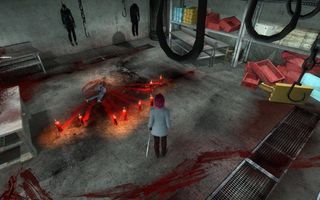
Ability points dictate the attacks and passive bonuses you can use. Seven of each can be equipped at any one time in a customisable deck that makes up your character's build. These skills are bought by means of the ability wheel – a branching list of weapon-specific actions and traits that can be swapped in and out of active use at any time.
The game attempts to direct you, by providing faction-specific decks to follow. Despite this, the open nature of the system is evident. My Paladin build could be followed by any player of any faction, but only the Templar agents would get the special outfit rewarded for completing a deck.
In solo PvE it makes for subtle shifts rather than dramatic changes to your attack style. There's a lot of wastage, as the more expensive highpowered attacks are only available by first buying all the lower branch abilities for that weapon, followed by all the preceding ones on that particular segment. Your optimal attack patterns will remain unchanged for large periods of time, punctuated by occasional experimentation and alterations.
When grouping, the amount of extra, seemingly redundant attacks you collect start to make sense. When my party's healer dropped out during one dungeon run, we were able to cobble together enough spare abilities to take the strain. Similarly, each person had a couple of threat-generating actions. Not enough to fully switch to tanking, but a helpful backup if the need arose.
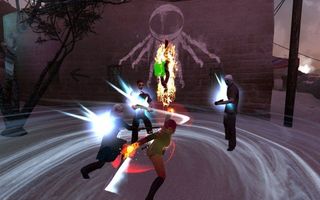
The system breeds a lack of specialisation and definition, but the freedom to shift into whatever gap needs filling makes for a welcome change. Combined with the user-friendly grouping system – which lets you join up and play with friends regardless of what server or faction they occupy – it ensures playing with others is easy and enjoyable.
Your skill points, meanwhile, act as a granular and customisable levelling system, allowing you to put points into weapons or stat boosting talisman items. The higher the point level, the better quality equipment you can equip, and it's this equipment that decides the power of your character.
Given the scarcity of shops in the game, you'll need to create most of the weapons and equipment yourself. Crafting isn't complicated, just needlessly obtuse. Unwanted weapons and items can be disassembled into metal and elemental components. These can then be upgraded into better quality versions which, when combined with a toolkit of a specific level, will create the item you need. But actually doing this requires you to make the crude shape of the object in the blueprint panel. It's like someone looked at Team Fortress 2's metal crafting and thought it would be neat if there was a memory test at the end.
The Secret World's faction system feels underdeveloped. Whether you choose Illuminati, Templars or Dragon, your experience will be broadly the same. Despite each having a separate starting location, used to pick up the small number of faction-specific quests you'll encounter, the main drive of the plot is identical for each character. The idea that each side exists in an uneasy truce is only really explored in PvP.
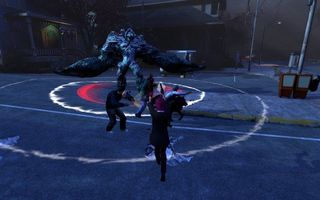
There's no open-world PvP, so combat takes place on two objective-based battlefields and the Fusang Projects warzone. While the hundreds of players clashing over the warzone can be an impressive sight, the whole thing feels like an afterthought, tacked on because it's an MMO requirement. Ironically, the reason it doesn't work is the same ability wheel that makes PvE grouping so good. With no set class definitions, it can be impossible to predict the tricks your opponent is bringing to a fight, making each encounter a gamble.
Also lacking, at least for now, is the endgame content available when players eventually finish the story. Currently there are nightmare-difficulty dungeons for players to tackle, but the direction taken with future updates will determine how long it's worth renewing your subscription for.
Perhaps tellingly, there's already a microtransaction store for cosmetic items. Whether that's a hint of the game's ultimate direction, or just a sign that people are happy to pay for bunny slippers, remains to be seen. At the moment, it's not enough to keep me playing beyond the conclusion of the story, and I'd imagine all but the most hardcore of stat-tweakers would feel the same – especially with PvP so flimsy. If Funcom don't apply some serious and quick work to the endgame, then don't bother renewing your subscription after your second month, when the story and dungeons have run their course.
The Secret World shows a lot of ambition. The story is engaging, the setting atmospheric and the user-friendly core systems are a welcome progression. I'm happy to forgive – even celebrate – the things it attempts, even when they don't work as well as intended. But it still feels uncomfortably shackled to familiar MMO compromises, and you'll spend much of your time trudging through the same tiresome genre filler: the padding of content and lackluster combat are both things done better by other games in the genre. That it's still worth a look is testament to the quality of what it does get right.
The weak combat and MMO padding hurt the experience, but The Secret World has innovation, atmosphere and charm.

Phil has been writing for PC Gamer for nearly a decade, starting out as a freelance writer covering everything from free games to MMOs. He eventually joined full-time as a news writer, before moving to the magazine to review immersive sims, RPGs and Hitman games. Now he leads PC Gamer's UK team, but still sometimes finds the time to write about his ongoing obsessions with Destiny 2, GTA Online and Apex Legends. When he's not levelling up battle passes, he's checking out the latest tactics game or dipping back into Guild Wars 2. He's largely responsible for the whole Tub Geralt thing, but still isn't sorry.
